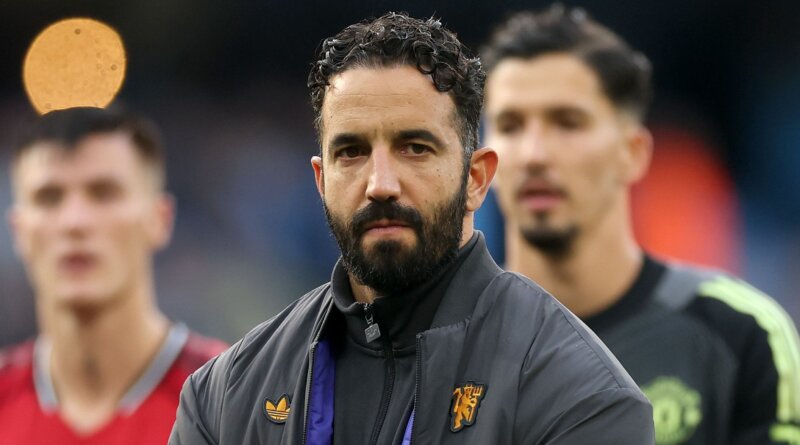Manchester United Players Losing Confidence in Ruben Amorim
Manchester United players’ confidence in Ruben Amorim’s tactical system is reportedly wavering following their heavy defeat to Manchester City, raising new questions about the manager’s future at Old Trafford.
Ruben Amorim’s Tactical Approach Under Scrutiny
Manchester United’s recent loss against Manchester City has intensified internal doubts about Ruben Amorim’s methods. The Portuguese coach, known for his unwavering commitment to his footballing philosophy, faced further scrutiny after the drubbing at the Etihad. According to reports, several United players, including captain Bruno Fernandes, are dissatisfied with the tactical setup, feeling it exposes weaknesses and stifles individual strengths.
Amorim has publicly asserted that he would prefer to be dismissed rather than compromise his principles. This stance, while admirable to some, has not translated into results or unity within the squad. The Red Devils’ struggles in big matches, particularly against elite opposition like Manchester City, have amplified the sense of unease in the dressing room.
Bruno Fernandes’ Frustrations Come to Light
Club captain Bruno Fernandes, a vocal leader on and off the pitch, is said to be one of the most visibly frustrated players. Sources close to the team suggest Fernandes has privately questioned the effectiveness of Amorim’s tactical rigidity, especially when United fall behind in high-pressure matches. This lack of adaptability has reportedly led to growing tension between the manager and his senior players.
Fernandes’ concerns echo the feelings of several teammates, who believe that Amorim’s system limits their ability to respond to dynamic, fast-paced opponents. With United’s ambitions of Champions League qualification under threat, the captain’s discontent could prove pivotal in shaping the future direction of the club.
Players Struggle to Adapt to Amorim’s System
The aftermath of the Manchester derby has sparked frank conversations among the squad, with some players questioning whether Amorim’s methods can deliver consistent success in the Premier League. His preference for a high defensive line and intricate build-up play has, at times, left United vulnerable to counter-attacks and exposed defensive frailties.
Hopes that Amorim’s philosophy would usher in a new era of attacking football have so far been undermined by a series of disappointing results against top-six rivals. United’s performances have often lacked fluidity, with players seemingly unsure of their roles during key moments. This has contributed to the reported erosion of confidence in the manager’s approach.
What Next for Manchester United and Ruben Amorim?
As United prepare for a crucial Champions League fixture against SSC Napoli and a marquee Premier League clash with Chelsea, all eyes are on how Amorim responds to mounting pressure. The manager remains steadfast, insisting his principles will not change, yet the growing disconnect between him and his players poses a significant challenge.
Club executives are monitoring the situation closely, aware that a prolonged slump could force difficult decisions in the coming weeks. For now, Amorim still has the backing of the club hierarchy, but results on the pitch must improve if he is to retain the support of both the board and the dressing room.
Opinion: Amorim’s Philosophy Needs Flexibility
While a clear managerial philosophy is important, the Premier League demands adaptability. Amorim’s commitment to his system has brought both admiration and concern. To succeed at Manchester United, he must find a balance between staying true to his beliefs and empowering his players to thrive – especially in big matches. A collaborative approach could be the key to restoring confidence and unity within the squad.
For more news and in-depth coverage of Manchester United’s season, visit for more news.
Your global gateway to nonstop football coverage:
News Goal
Share this content:

